MercoPress. South Atlantic News Agency
Tag: argentina economy
-
Thursday, May 16th 2019 - 09:44 UTC
Argentina's unions decided a 24-hour national strike on 29 May

Argentina’s biggest labor union on Tuesday called for a 24-hour national strike to protest the government’s austerity policies, heaping pressure on President Mauricio Macri as he battles against a biting recession and jittery markets.
-
Wednesday, October 17th 2018 - 08:24 UTC
Jamaican economist will oversee Argentina's compliance of IMF accord
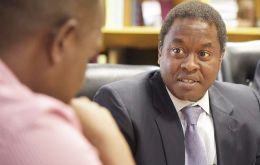
The International Monetary Fund has announced that Jamaican economist Trevor Alleyne will be the institution's representative in Argentina, after confirming it had decided to reopen an office in Buenos Aires, six years after leaving. The decision comes after Buenos Aires reached a deal with the IMF on the money supply, interest rates and an exchange rate framework.
-
Monday, October 1st 2018 - 08:56 UTC
Beijing currency swap support for Argentina
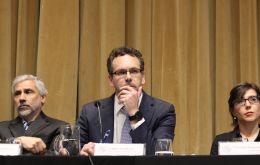
Argentina has “nearly closed” a new currency swap deal with China that will add the equivalent of US$ 9 billion to the South American country’s reserves, the central bank said on Sunday. Argentina and China first agreed to a swap program in 2009 to boost the South American country’s dwindling reserves under former President Cristina Fernandez. Last year, the center-right government of President Mauricio Macri and China agreed to extend the program for three more years.
-
Thursday, September 27th 2018 - 09:19 UTC
Argentine Peso with trading band and zero growth monetary supply policy
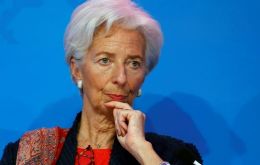
The International Monetary Fund Managing Director Christine Lagarde, speaking at a news conference in New York alongside Argentine Economy Minister Nicolas Dujovne, said IMF was “significantly frontloading” disbursements under the program adding the Argentine central bank had agreed as part of the deal to allow the peso currency to float freely and would only intervene in the foreign exchange market in extreme circumstances.
-
Monday, September 17th 2018 - 08:12 UTC
International support for Argentina's general strike against IMF austerity measures
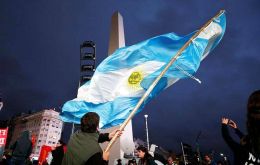
The International Trade Union Conference, ITUC’s affiliates in Argentina, CGT, CTA-A and CTA-T have announced a general strike for 24-25 September in opposition to expected sweeping austerity measures being developed by the government and the International Monetary Fund.
-
Friday, September 14th 2018 - 09:18 UTC
Argentine inflation in August rose 3.9%, and 34.4% in twelve months

Argentina says consumer prices rose 3.9% in August, the highest rate so far this year. That brings the 12-month nationwide inflation rate to 34.4%, one of the world's highest.
-
Thursday, September 13th 2018 - 10:39 UTC
IMF team in Buenos Aires for talks on the standby loan package
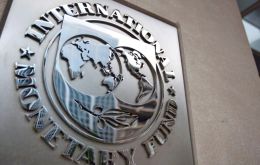
Officials from the International Monetary Fund are in Argentina as part of talks to strengthen and accelerate a crisis loan package, the global lender said Wednesday. The IMF and Buenos Aires agreed in June on a three-year, US$50 billion rescue lending programme but Argentina has since asked for a more rapid disbursement.
-
Thursday, September 13th 2018 - 10:34 UTC
Argentine labor unions and social groups protest austerity measures in Buenos Aires City
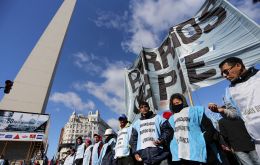
Labor unions and social groups blocked streets in downtown Buenos Aires on Wednesday, with more marches planned over the days ahead over austerity measures proposed by the government and backed by the International Monetary Fund. Protesters are angry about the belt-tightening policies, which are cutting services to low-income Argentines already walloped by inflation of 31 percent and climbing.
-
Wednesday, September 12th 2018 - 08:55 UTC
Argentina's central bank keeps key interest rate at 60%
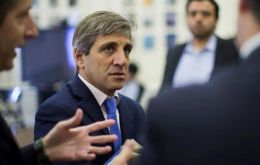
Argentina's central bank kept its key interest rate on Wednesday at 60%, one of the highest in the world, following a surprise hike two weeks ago after the peso plunged. Central bank officials said in a statement that inflation accelerated in August and continues to do so September, citing high-frequency data.
-
Thursday, July 19th 2018 - 07:44 UTC
Macri offers optimistic forecast of Argentine economy, pledging growth will return next year
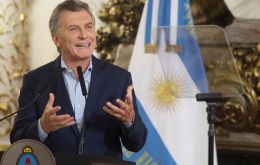
Argentina’s economy will return to growth in 2019, President Mauricio Macri said on Wednesday, following a year marked by higher-than-expected inflation and a run on the Peso currency that many economists anticipate will lead to a recession.
